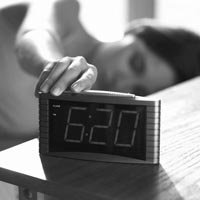We’ve all been there: it’s early, you’re tired and your alarm just won’t let up. You reach across the night stand (or stumble across the room) and instead of hitting ‘off’ you decide to hit ‘snooze’ and head back to bed.
For some of us, this is a daily occurrence, especially in college. If you don’t HAVE to get up for an exam or a job, you may find yourself dealing with this problem all the time.
But is this really the best way to relieve your sleepiness? Do you EVER feel more rested when you hit snooze or do you continue to feel groggier as you attempt to catch a few more z’s?
Whether you are going to bed too late or you just aren’t a “morning person,” it’s time to recognize the reasons for your lack of sleep and start focusing on how you can get more sleep WITHOUT hitting the snooze button!

Why is Hitting ‘Snooze’ a Problem?
According to an article from CityTV.com, your sleep cycle follows this pattern: beginning with non-REM sleep (which can be viewed as your body’s “prep” for REM sleep), lasts about 3 hours before you enter REM sleep. REM sleep cycles last about 10 minutes each, but you enter several throughout your resting cycle.
The sleep that helps you to feel alert, focused and well-rested is REM sleep; this sleep cycle is when you are most relaxed and most deeply asleep. Your body is able to restore itself and you get the most out your bedtime.
When you emerge from resting due to an alarm going off, you may have been engaged in REM sleep, so hitting the snooze button over and over again will only have you drifting in and out of NREM sleep anyway, which isn’t helping you at all.
Stop Hitting ‘Snooze’!
When this is your alarm clock and you still can’t get up! It’s okay to hit the snooze button on days when you know you just aren’t getting up on time, but if you find yourself hitting snooze on a regular basis, it’s time to investigate your lifestyle to find out why you can’t get out of bed.
Getting to bed too late.
It’s no wonder you can’t get up at 6am when you head to bed at 2. If you have gotten yourself into a bad routine (i.e. – waiting up until 1am to watch South Park or a show that plays late at night), you need to break that habit and head to bed early.
Try heading to bed an hour before you typically go to bed. You may not fall asleep right away, but if you try this on Monday, by Wednesday, you should be able to fall asleep at the earlier hour. You can continue to do this until your body adjusts to whatever time you want to go to bed.
Cut the caffeine by 4pm.
Stop drinking caffeinated drinks by 4pm. If you have an exam, study until you cannot stay awake any longer; do not drink coffee at 9pm so you can stay awake into the wee hours of the night.
Instead of simply falling asleep once you are finished studying (or can no longer read another notecard), you will end up staying up and watching TV or floating around your dorm/apartment until you can FINALLY fall asleep. You will wake up tired and groggy for your exam, rather than alert and rested.
Weekend transition.
If you typically go to bed around 11pm on weeknights, but you stay up until 5am on the weekends (and thus, sleep late on Saturday and Sunday), it may be time to change your lifestyle.
Try heading to bed around 1 or 2am on the weekends so you can set your alarm for a reasonable time in the morning. If you can’t stop your late-night partying, then force yourself to get up by setting an alarm for 10 or 11am.
Have your roommates pick you up a coffee in the morning so you can give yourself a boost before getting out of bed.
Workout in the morning.
If you workout at night, past 7pm, it’s like pouring motor oil into your mustang and then parking it in the garage. Don’t rev your body up just to force it into bed an hour or two later.
Working out gives you energy and drinking a lot of water during your workout will also give you an extra boost. Drinking a lot of water at night can also keep you running to the bathroom during the night.
Schedule your workouts for the morning so you will not only have energy during the day, but by the time bedtime rolls around, you will be tired from a long day at school as well as your early workout.
Stop doing work in bed.
I know it’s tempting to bring your books into bed with you, but if you start doing everything in your room and in bed, you will stop associating your bed with sleep.
Head to the library or common area to study, watch TV or hang out with friends. This way, when you are finished with your duties, your bed will appear as a beacon of rest and relaxation, and not just another place for you to review your flashcards.
No TV or computer an hour before bed.
The best way to prepare your body for sleep is to have some quiet time right before bed. Instead of flipping on the television or using your computer while in bed, leave those items behind and pick up a book instead. You don’t have to pick up a textbook, but an easy read is just the thing to tire your eyes and get your body prepared to sleep.
Quiet time before bed.
If reading isn’t on your list of to-do’s before bed, try listening to some soft music, taking a hot shower, or meditating before bed. Any of these things are sure to prepare both your mind and body for sleep.


